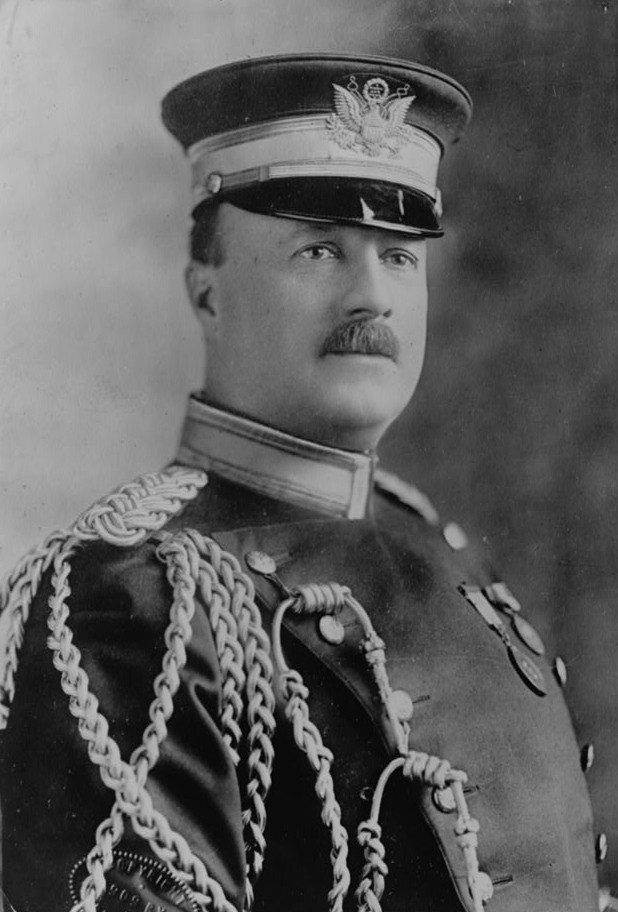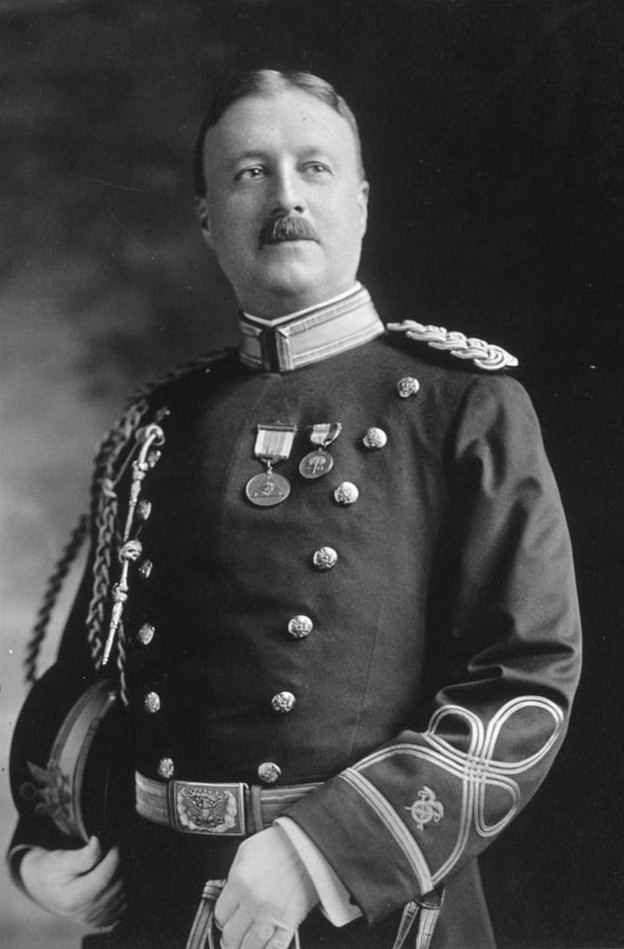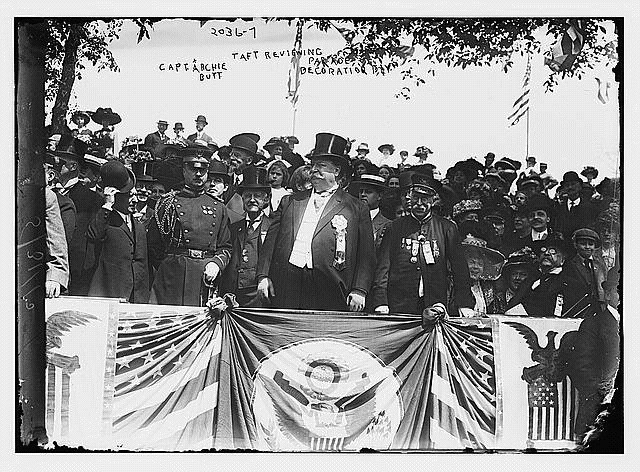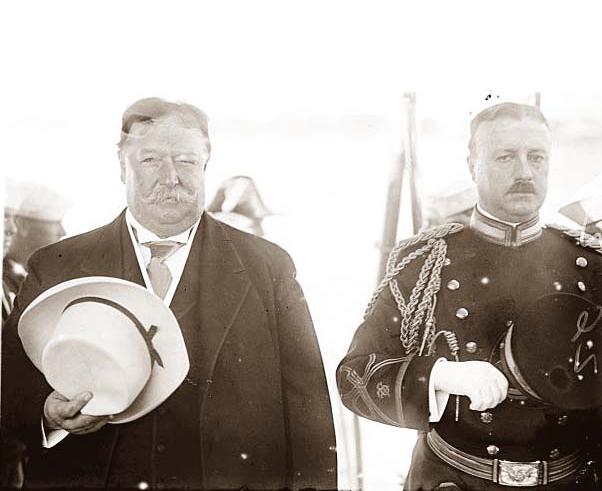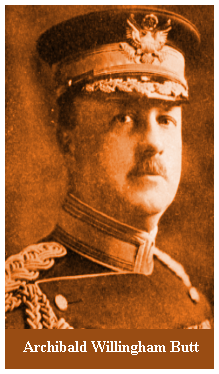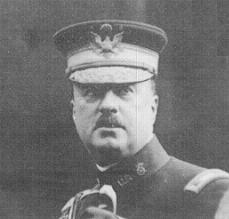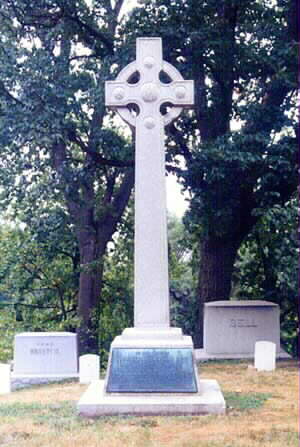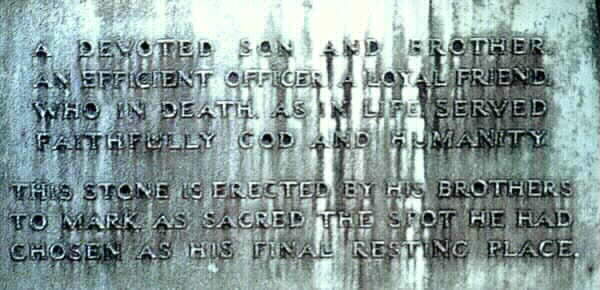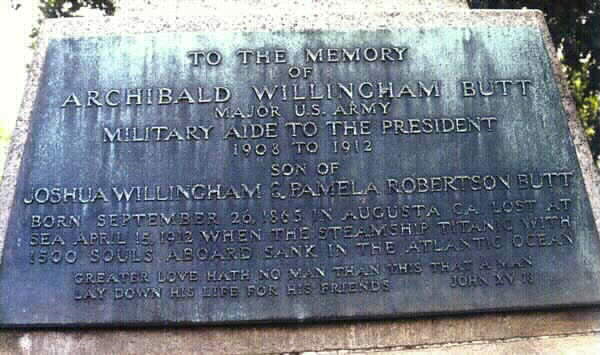Born at Augusta, Georgia, September 26, 1866, he graduated from the University of the South. He was unmarried.
He was appointed Captain, Assistant Quartermaster, United States Volunteers on January 2, 1900 and honorably discharged from the Volunteer service on June 30, 1901. He served as a Quartermaster in the Philippines, March 1900-June 1903 during the Insurrection there. Then he served as Depot Quartermaster, Washington, D.C., July 1903-September 1906 and in Havana, Cuba, September 1906-August 1908.
He served as a personal aide to President Theodore Roosevelt, April 1908-March 1909 and to President William Howard Taft, March 4, 1909. His home was in Washington, D.C.
He is not actually buried in National Cemetery, but a memorial marker in Section 3 reads:
“Military aide to the President (1908-12),
son of Joshua Willingham and Pamela Robertson Butt. Born September 26, 1865 in Augusta, Georgia.
Lost at sea on April 16, 1912, when the steamship Titanic with 1500 souls on board sank in the Atlantic ocean.
Greater love hath no man than this, that a man lay down his life for his friends.”
Archibald W. Butt was born in Augusta, Georgia on September 26, 1865. Butt was tall and distinguished looking , the stereotypical Southern gentleman. He had served as aide to Teddy Roosevelt and when William Howard Taft became president in 1908, Major Butt continued with Taft. He developed a strong friendship with both men and by the last year of Taft’s presidency Butt was caught in an impossible situation. Taft had become extremely unpopular by this time and Roosevelt was beginning to make overtures of running again to defeat Taft. Butt was torn between these two men and requested a leave of absence to travel to Europe and relax before being drawn in to the upcoming presidential campaign.
Butt was exceptionally loyal to Taft. At the White House New Year’s reception of 1912, Butt had jacked up the Secret Service’s guest counting machines by a thousand, so that Taft would not have be faced with such a stark statement of his unpopularity. That was the kind of man Archibald Butt was.
Major Butt’s usefulness at official functions at the White House was legendary. At a reception given for the leading members of America’s judiciary, he presented an incredible 1,275 people to President Taft in a single hour.
On the night of April 14th Major Butt had dined with Captain Smith at the Widener Dinner Party in the à la carte Restaurant. After dinner Butt and his friends retired to the Café Parisien a popular place for Titanic’s First Class to meet and people watch. When the Titanic struck the iceberg at 11:40 p.m. Major Butt was informed by Captain Smith that the ship was doomed and that the lifeboats were being readied. Butt immediately sprang into action and became another officer on board the ship. He gave words of encouragement to the weeping women and children, and giving stern commands when needed to the slow and inefficient crew members.
Mrs. Henry B. Harris, said in an interview about Major Butt:
“I saw Major Butt just before they put me into a collapsible raft with ever so many women from the steerage. Mr. Millet’s little smile, which played on his lips all through the voyage, had gone, but when I was put in the boat I saw him wave his hand to a woman in another boat.”
“But oh, this whole world should rise in praise of Major Butt. The man’s conduct will remain in my memory forever; the he showed some of the other men how to behave when women and children were suffering that awful mental fear that came when we had to be huddled into those boats. Major Butt was near me, and I know very nearly everything he did.”
“When the order to take to the boats came he became as one in supreme command. You would have thought he was at a White House Reception, so cool and calm was he. A dozen or so women became hysterical all at once as something connected with a lifeboat went
wrong. Major Butt stepped to them and said: ‘Really you must not act like that; we are all going to see you through this thing.’
“He helped the sailors rearrange the rope or chain that had gone wrong and lifted some of the women in with gallantry. His was the manner we associate with the word aristocrat.”
Archibald Butt died that night and his remains were never recovered. Many stories regarding Butt’s gallantry were printed in the press after the tragedy. In a book titled: “Memorial Edition Sinking of the Titanic-Thrilling Stories Told By Survivors”, entered according to act of Congress in the year 1912, by Geo. W. Bertron, The Office of the Librarian of Congress, at Washington, D.C., U.S.A., a special page is devoted to the memorial services held for Archibald Butt in Augusta, Georgia. The following is from that page:
Fifteen hundred sincere mourners for Major Archibald W. Butt, lost on the Titanic, wept unashamed at his home in Augusta, Georgia, on May 2, when President Taft called his former aid affectionately by his first name and choked with tears as he paid a personal tribute to the army officers.
It was a monster memorial service for the soldier, where all Augusta paid homage to his memory. President Taft was the main speaker. He was deeply affected by the
solemn ritual.
“If Archie could have selected a time to die he would have chosen the one God gave him,” the President said, his voice broken with emotion.
“His life was spent in self-sacrifice, serving others. His forgetfulness of self had become a part of his nature.
“Everybody who knew him called him Archie.”
“I couldn’t prepare anything in advance to say here,” the President continued. “I tried, but couldn’t. He was too near me. He was loyal to my predecessor, Mr. Roosevelt, who selected him to be military aide, and to me he had become as a son or a brother.”
Taft pictured a new side to Major Butt’s character-his love for his mother.
” I think he never married because of that love for her who was taken from him two years ago,” the President declared.
After Major Butt’s Memorial Service Taft fell into a deep depression and along with Teddy Roosevelt leaving the Republican party after Taft’s nomination, Woodrow Wilson won the election later in 1912. Taft served as Professor of Law at Yale until President Harding made him Chief Justice of the United States, a position he held until his death in 1930. To Taft, the appointment was his greatest honor; he wrote: “I don’t remember that I ever was President.”
Even though Archibald Butt was a major political force in 1912 and an honored Titanic hero, today he is hardly remembered. Most Titanic books scarcely mention him and most films ignore him entirely. Most likely it’s due to his quiet competence and his kind nature which figured so importantly that night of April 14th. He was not a flashy man and did not try to steal the spotlight.
Today, there is a fountain near the White House in his honor along with a Memorial Marker at Arlington National Cemetery and a bridge in Augusta, Georgia. To learn more about these memorials click here to see photos of them and read about my experience in finding his unknown marker at Arlington National Cemetery.
Major Archibald Willingham Butt, 45, from Washington DC, USA boarded the Titanic at Southampton with his friend Francis D. Millet.
An influential military aide to President William Howard Taft and President Theodore Roosevelt, Archibald Butt was born into a prominent Augusta, Georgia, family. After his graduation in 1888 from the University of the South in Tennessee, Butt began a career in journalism, first writing for the Louisville Courier Journal and later as a reporter in Washington for a group of Southern newspapers. While working in Washington he became secretary of the Mexican Embassy with General “Matt” Ransom, Confederate officer and former United States senator from North Carolina.
In 1898 Butt left Mexico to enter the United States army as a lieutenant during the Spanish-American War, and decided to make the military a second career. He served in the Philippines from 1900 to 1906, then in Cuba before becoming military aide to President Theodore Roosevelt in 1908. Butt’s health began to deteriorate in 1912 because of his attempts to remain neutral during the bitter personal quarrel between Roosevelt and Taft. Needing rest, he took six weeks’ leave from the White House and sailed for Europe with his close friend Francis Millet, who was en-route to Rome on business at the American Academy which he directed. They were returning to Washington on the Titanic.
Following the disaster rumours circulated that Ms Marie Grice Young had conversed with Major Butt during the sinking and she was forced the write to the president to set the record straight.
May 10, 1912 Briarcliff Lodge, Briarcliff Manor, New York.
President William H. Taft
Dear Mr. President:
I have read an account of the Memorial Service held in Washington recently in honor of Major Archibald Butt, at which service the Secretary of War alluded to a farewell conversation supposed to have taken place between Major Butt and myself. Had such a conversation taken place I should not have delayed one hour in giving you every detail of the last hours of your special Aide & friend.
“Although a Washingtonian I did not know Major Butt, having been in deep mourning for several years. The alleged “interview” is entirely an invention, by some officious reporter; who thereby brought much distress to many of Major Butt’s near relatives and friends… for when they wrote me of what a comfort the story was to them, I had to tell them it was untrue, as no such deception could be carried through.
They wrote me that through Mrs. Sloan’s kindness, they obtained my address… and I immediately wrote Mrs. Sloan that there was no truth in this newspaper story.
When I last saw Major Butt, he was walking on deck, with Mr. Clarence Moore, on Sunday afternoon.
With deep regret that I could not be his messenger to you, Believe me,
Very sincerely yours
(Miss) Marie G. Young
After their deaths the Millet-Butt Memorial Fountain was erected to their memory in Washington, DC
‘MAJ. BUTT DIED LIKE AN ARMY HERO’
“God Never Made Finer Nobleman,” Says Mrs. Henry B. Harris.
SOLDIER TO THE LAST
President’s Aide Looms as the Most Heroic Figure of the Great Disaster.
DISPERSED ALL THE PANIC
Grimly Yet Gently Helped Women to the Boats and Cheered Fellows.
Washington, D.C., April 19, — Mrs. Henry B. Harris of Washington describes the heroism of Maj. Butt. She said:
“Archie Butt was a major to the last, God never made a finer nobleman than he. The sight of that man, calm, gentle and yet as firm as a rock, will never leave me. The American army is honored by him and the way he showed some of the other men how to behave when women and children were suffering that awful mental fear that came when we had to huddle in those boats. Maj. Butt was near me and I know very nearly everything he did.
“When the order came to take to the boats he became as one in supreme command. You would have thought he was at a White House reception, so cool and calm was he. When the time came he was a man to be feared. In one of the earlier boats fifty women, it seemed, were about to be lowered when a man suddenly panic stricken ran to the stern of it.
HELD ONE MAN BACK.
“Maj. Butt shot one arm out caught him by the neck and jerked him backward like a pillow. His head cracked against a rail and he was stunned.”
“Sorry,” said Maj. Butt, “women will be attended to first or I’ll break every damned bone in your body.”
“The boats were lowered away, one by one, and as I stood by my husband he said to me, “Thank God for Archie Butt.” Perhaps Maj. Butt heard it, for he turned his face towards us for a second. Just at that time a young man was arguing to get into a lifeboat, and Butt had hold of the lad by the arm, just like a big brother, and appeared to be telling him to keep his head.
“How inspiring he was. I stayed until the last and know what a man Archie Butt was. They put me in a collapsible boat. I was one of the three women from the first cabin in the thing, the rest were steerage people.
HELPED ALL THE WOMEN.
“Maj. Butt helped those poor frightened steerage people so wonderfully, tenderly and yet with such cool and mannerly firmness; he was a soldier to the last. He was one of God’s greatest noblemen, and I think I can say he was an example of bravery even to the officers of the ship. He gave up his life to save others.”
President Taft accepted an invitation to attend memorial exercises to be held by Temple Lodge, Free and Accepted Order of Masons, of which Maj. Butt was a member, to be held in this city on May 5. The president probably will make an address, and those in charge of the meeting, which will be a memorial for Maj. Butt, hope to have Henry Watterson as another speaker.
A permanent memorial to the heroism of Maj. Butt and the other Washingtonians who died on the Titanic was informally discussed by some members of the cabinet and other government officials.
LAST SEEN ON DECK.
New York, April 19 — “Archie” Butt died a hero’s death. Knee deep in the icy waters that swept the bridge of the Titanic, the last view survivors caught of President Taft’s military aide.
The rescued on the Carpathia said that Maj Butt, Col. Astor and Howard Case were the conspicuous heroes of the world’s greatest sea disaster. It was Maj. Butt who lined up the panic stricken women, met the frenzy of despair with the cool, calm judgement of the soldier, and was swept in the valley of the shadow of death, unafraid.
SILHOUETTED AGAINST SKY.
His last goodbye was smilingly said to Miss Marie Young, formerly a music teacher to some of the Roosevelt children. Miss Young had frequently met Maj. Butt at the White House. She was on the last boat to leave.
“Maj. Butt escorted me to a seat in the bow,” she said today. He helped me find a space, arranged my clothing about me, stood erect, doffed his hat and smiled and said ‘Good-by.’ And then he stepped back to the deck, already awash. As we rowed away we looked back, and the last I saw of him he was smiling and waving his hand to me.”
SMILING IN LAST FAREWELL.
Dr. Washington Dodge of San Francisco thinks he saw the last of Maj. Butt silhouetted against the sky. He saw Butt and Col. Astor heads erect, their arms apparently around each others shoulders standing on the bridge of the Titanic as the stricken leviathan lurched into the cold black waters.
An act of Congress saves Augusta bridge named for Titanic hero
By Robert Pavey Staff Writer –
September 1998
AUGUSTA – Movie fans and two members of Congress may have spared an Augusta bridge, named for a hero of the Titanic, that was slated for demolition. President William H. Taft visited Augusta to dedicate the downtown bridge to his aide Maj. Archibald Butt, an Augusta native who perished on the fated ship in 1912.
“Never did I know how much he was to me, until he was gone,” a tearful Taft told 1,500 mourners.
Butt helped scores of hysterical women and children into lifeboats as the luxury liner foundered in the north Atlantic Ocean. His remains were never recovered.
Today, after a 17-year stalemate, an amendment to the federal transportation bill will exempt the bridge from spending guidelines that were prompting state engineers to dismantle the bridge.
“The interest that’s grown out of this film is bigger than anybody would have guessed,” said Ross Snellings, who founded the Butt Memorial Bridge Legal Defense Fund
five years ago to save the span.
Despite its intricate ironwork, glass globes, gilded lions and painted masonry eagles, the humpback bridge was deemed incapable of handling traffic flowing. In 1981, the Georgia Department of Transportation wanted to use $15 million in federal money for a rail and road realignment that would have replaced or disconnected the bridge from traffic. But if the project wasn’t built, the money would be lost.
City officials have worked ever since to find a way to use the appropriation without destroying the bridge. One plan even envisioned moving the structure. This fall, U.S. Sen. Paul Coverdell and U.S. Rep. Charlie Norwood added language in the federal transportation appropriations bill allowing the city to use the $15 million for “modifications and additions to streets and railroads” in the vicinity of the bridge. The language replaces earlier, stricter stipulations requiring specific improvements at Butt Bridge.
“We’re basically trying to free up the money and let them (city officials) figure some other way to solve the problem,” said John Stone, Norwood’s press secretary. The legislation is pending in a conference committee and is expected to pass this year. City officials hope to use the money to erect a new bridge to handle some of the traffic that clogs up 15th Street.
The progress, occurring in a year when international attention has been focused on the Titanic and its legacy, pleases people like Snellings.
“A whole new generation knows all about the Titanic,” he said. “And this is the only memorial to the Titanic disaster in Georgia. Now we’ve got Leonardo DiCaprio and Kate
Winslet as ambassadors to the Butt Bridge.”
Major Archibald Willingham Butt:
Born September 26, 1865, in Augusta
Graduated from University of the South.
Worked as a newspaper reporter in Louisville, Kentucky, and Macon, Georgia.
Became a trusted aide to President William H. Taft.
Died April 15, 1912, aboard the luxury ocean liner Titanic.
One of the most highly praised passenger-heroes was Colonel Archibald Butt, Aide to US President Taft, who ensured the safety and eventual rescue of countless people. “When the order to man the boats came, the captain whispered something to Major Butt…the Major immediately became as one in supreme command. You would have thought he was at a White House reception. A dozen or more women became hysterical all at once, as something connected with a life-boat went wrong. Major Butt stepped over to them and said, ‘Really, you must not act like that; we are all going to see you through this thing.’ He helped the sailors rearrange the rope or chain that had gone wrong and lifted some of the women in with a touch of gallantry. Not only was there a complete lack of fear in his manner, but there was the action of an aristocrat.”
“When the time came, he was a man to be feared. In one of the earlier boats, fifty women, it seemed, were about to be lowered, when a man, suddenly panic-stricken, ran to the stern of it, Major Butt shot one arm out, caught him by the back of the neck and jerked him backward like a pillow… ‘Sorry,’ said Major Butt, ‘women will be attended to first or I’ll break every damned bone in your body.'”
Another survivor said, “The boats were lowered one by one, and as I stood by, my husband said to me, ‘Thank God for Archie Butt.’ Perhaps Major Butt heard it, for he turned his face towards us for a second and smiled. Just at that moment, a young man was arguing to get into a life-boat, and Major Butt had a hold of the lad by the arm, like a big brother, and telling him to keep his head and be a man. Major Butt helped those poor frightened steerage people so wonderfully, so tenderly and yet with such cool and manly firmness that he prevented the loss of many lives from panic. He was a soldier to the last. He was one of God’s greatest noblemen, and I think I can say he was an example of bravery even to men on the ship.”
Shortly after the accident, President Taft attended a memorial service in Augusta, Georgia, Major Butt’s birthplace, where he also dedicated a bridge in the Major’s honor.
The sinking of the Titanic (1912) by Jay Henry Mowbray
HAPTER XI.
MAJOR BUTT, MARTYR TO DUTY.
Major Butt Martyr to Duty–Woman’s Soul-Stirring Tribute–Died Like a Soldier–Was the Man of the Hour–Assisted Captain and Officers in Saving Women–Cool as if on Dress Parade–Robert M. Daniel Tells of Disaster and Death of Heroes–Tiny Waifs of the Sea.
Captain E.J. Smith, the commander of the Titanic, was a guest at a banquet which was being given by W. Bruce Ismay, managing director of the White Star Line, when the big steamer plunged into that fated iceberg, according to Robert M. Daniel, member of the banking firm of Hillard-Smith, Daniel & Co., 328 Chestnut street, Philadelphia.
The fourth officer was in charge of the vessel, said Mr. Daniel, when seen at the Waldorf-Astoria in New York, to which hotel he went immediately after landing from the Carpathia, accompanied by his mother and younger brother, who had come up from their home in Virginia to meet him.
“We were about fifty miles ahead of our schedule at the time the accident happened,” said Mr. Daniel, “and were running at about a twenty-mile-an-hour rate. Everybody on board had been talking all along about how we were trying to beat the Olympic’s record for the Western trip and many pools were made on each day’s run.
“I was asleep in my berth when the collision came and so cannot tell how we happened to hit that berg or what occurred immediately afterwards. I got up and looked out of my stateroom door; but all seemed to be quiet and I went back to bed again.
“A little later I heard some one crying that the boats were being manned and I got frightened. So I wrapped an overcoat about me and went on deck. On the way I grabbed a life belt and tied it on.
“The boat had already sunk so far down that the lower decks were awash. I didn’t waste any time in thinking. I just jumped overboard. I clung to the same overturned lifeboat that young John B. Thayer, Jr., swam to later and saw him jump from the Titanic. It looked to me as though his father pushed him off and jumped after him, but the boat sank so soon afterwards and things were so mixed up that I couldn’t be sure about that.
“A boat came by after a while that was full of women. They were frightened and seeing me, pulled me aboard, saying they needed a man to take charge. I did my best to cheer them up, but it was a poor effort and didn’t succeed very well. Still I kept them busy with one thing and another and so helped pass the weary hours until we were picked up by the Carpathia.”
JUMPED AS THE LINER WAS GOING DOWN.
Mr. Daniel stated with emphasis that Colonel John Jacob Astor stayed on the Titanic until the last second, then jumped just as the liner was going down, and he did not see the millionaire again.
Captain Smith also stuck to the bridge, until the ship sank, said Mr. Daniel, when the skipper also jumped, but disappeared below the waves and apparently never came up again.
“I spoke to the fourth officer just before I went to my cabin,” said Mr. Daniel, “and he told me he was in charge while the captain was at dinner. Then I remembered I had heard Ismay was giving a banquet.
“The fourth officer said the skipper was coming up ‘pretty soon’ to relieve him,” added Mr. Daniel.
On the Carpathia, Mr. Daniel said, were nineteen women who had been made widows by the Titanic disaster. Six of them were young brides who were returning on the steamship from honeymoon trips on the Continent. None of them, he said, was able to obtain from the passengers of the Carpathia mourning garb.
While on the Carpathia Mr. Daniel proved of coniderable assistance to the wireless operator. He is an amateur student of wireless telegraphy. Following the disaster the operator on the Carpathia was compelled to work night and day.
While the operator was engaged in the arduous task of sending to shore the long list of those who had been snatched from the sea, Mr. Daniel went into the operating room. He found the operator on the verge of collapse, and, volunteering his services, sent a large part of the list himself.
Mr. Daniel denied that all the lifeboats and collapsible rafts launched from the Titanic had been picked up by the Carpathia.
“Only twelve boats were picked up,” he said, “while there were half a dozen more that drifted away in other directions. There has been no storm, and I don’t see why they should not have been located by some other vessel.”
“FRANKFURT” MUCH NEARER THAN CARPATHIA.
A German steamer, the “Frankfurt,” was thirty-five miles nearer to the Titanic than was the Carpathia at the time of the accident, but for some reason would not come to the assistance of the stricken liner, Mr. Daniel said.
Asked if any women had been left aboard the Titanic be said: “Only those women who positively refused to leave their husbands and who could not be forced into lifeboats for lack of time.
“One of the most remarkable features of this horrible affair is the length of time that elapsed after the collision before the seriousness of the situation dawned on the passengers. The officers assured everybody that there was no danger, and we all had such confidence in the Titanic that it didn’t occur to anybody that she might sink.”
As to the reports that many persons had been shot to prevent them from rushing the lifeboats, Mr. Daniel said several shots had been fired in the air to frighten the steerage passengers and keep them in order, but that he did not know or hear of anyone being hit by a bullet.
Mrs. John Jacob Astor, said Mr. Daniel, had been confined to her stateroom under the doctor’s care during her stay on the Carpathia. “I did not lay eyes on her nor on Bruce Ismay. He stuck close to his cabin and I don’t think he came on deck once during the trip on the Carpathia.”
Even when the passengers finally realized that the Titanic was doomed, there was no disorder, according to Mr. Daniel. The crew’s discipline was perfect and the women were placed in the boats quietly and without confusion. It was only after the ship had gone down, he added, and the women awoke to the fact that their husbands, brothers, sons and sweethearts, who had told them they would follow “in other boats,” had sunk to their death, that there was any hysteria.
THE CRIES WERE HEART-RENDING.
“Then the cries were awful to listen to; some of the women screamed all the time. For four straight hours they kept at it. First from one boat, then from another. It was heart-rending.”
Asked why the Carpathia had refused to answer the wireless messages relayed to her, Mr. Daniel answered that so many land stations were trying to get the vessel that the air was full of cross currents, and it was almost impossible to catch any one message meant for the rescue ship, let alone trying to reply to any of them.
While Mr. Daniel was talking to the newspaper men on the pier, just after landing from the Carpathia, a man ran up and, showing him two newspaper photographs, asked if he remembered the face.
“It’s my brother, Mr. White, of California,” said the man. “Is he on board the Carpathia?”
“I don’t think so,” answered Mr. Daniel. “I remember meeting this gentleman on board the Titanic, but I have not seen him since.” Mr. White’s brother grabbed the photographs and rushed away.
Many of the men, said Mr. Daniel, refused to jump from the Titanic until the ship was actually disappearing beneath the waves.
“They seemed to think they were safer on board,” he said, “and by waiting too long lost their chance of being saved for they were probably carried down by the suction. Howard B. Case, of New York, was one who declined to jump. C. Duane Williams was another. He was washed overboard, but his son, Richard Norris Williams, jumped and was saved.”
Mr. Daniel was in the water or on a cake of ice nearly an hour before he was pulled aboard a lifeboat. He had nothing to keep him from freezing save a light overcoat over his pajamas. While on the Carpathia he slept on the floor of the dining saloon and was so weak when he landed that he could hardly move.
When in Philadelphia, Mr. Daniel makes his home at the Southern Club, though he is a native of Richmond, Va., where his mother and brother live.
CRAWLED ON TO CAKE OF ICE.
“When I finally went on deck,” said Mr. Daniel, “the water already was up to my ankles. I saw the women and some of the men taking to the boats. A short distance away was a big cake of ice. I jumped for it and crawled on it.
“John B. Thayer, Jr., came to the same ice cake later, after the Titanic sank. Then a boat passed near and he swam to it and was pulled aboard. A half hour afterwards another boat came by and I was pulled aboard.
“It seemed a long time before we saw the masts of the Carpathia, but when the straight masts and the blur of smoke from her funnels were outlined against the horizon, we realized that it meant rescue for all of us. When the boat finally reached us, the men in the boat did what they could to help the women to the vessel, but most of us were almost helpless from the cold and exposure.
“I cannot pretend to explain the accident. All I can say is that we knew for five hours before the accident that there were ice fields about. I saw Colonel Astor after I was on the raft. He was still on deck. The water was washing about his knees. He made no effort to get into a boat.
“The last I saw of Major Butt,” Mr. Daniel added, “he was playing bridge whist with Clarence Moore, of Washington, formerly of Philadelphia, and widely known as a horse show exhibitor, and two other men. This was just before I went to my cabin.
“When I came on deck again, I did not see him. I have no doubt he met his death as a soldier should.”
Major Archibald Butt, U.S.A., military aid to President Taft, who lost his life on the Titanic, met his death in a manner that fully justified the President’s estimation of him as expressed in the eulogy given out at the White House, in which the President tenderly referred to his late aide as a man “gentle and considerate,” and as one who was “every inch a soldier.”
GRAVITY OF THE TITANIC’S CONDITION.
From the moment the Titanic climbed to her death on the jagged shelf of the great iceberg until the last boatload of women and children, and some men, was lowered, Major Butt was to all intents and purposes an officer not only of the American Army, but of the British mercantile marine. He was among the first to realize the gravity of the Titanic’s condition, and he immediately forgot self and went to the assistance of the sorely taxed skipper and junior officers of the sinking liner.
From the moment that Captain Smith let it be known to his officers and a few of the men passengers that the Titanic was doomed, Major Butt was an officer of the Titanic. He was here and there and everywhere, giving words of encouragement to weeping women and children, and uttering when necessary commands to keep the weak-kneed men from giving in and rendering the awful situation even more terrible.
That this was the manner in which Major Butt met death is certain. Captain Charles E. Crain, of the Twenty-seventh United States Infantry was a passenger on the Carpathia, and when he learned that Major Butt was among the dead, he made it his duty to get
the true tale of his comrade’s death.
“Naturally,” said Captain Crain, “I was deeply concerned in the fate of Major Butt, for he was not only a fellow-officer of the army, but also a personal friend of many years’ standing. I questioned those of the survivors who were in a condition to talk, and from them I learned that Butt, when the Titanic struck, took his position with the officers and from the moment that the order to man the lifeboats was given until the last one was dropped into
the sea, he aided in the maintenance of discipline and the placing of the women and children in the boats.
AS COOL AS THE ICEBERG.
“Butt, I was told was as cool as the iceberg that had doomed the ship, and not once did he lose control of himself. In the presence of death he was the same gallant, courteous officer that the American people had learned to know so well as a result of his constant attendance upon President Taft. There was never any chance of Butt getting into any of those lifeboats.
“He knew his time was at hand, and he was ready to meet it as a man should, and I and all of the others who cherish his memory are glad that he faced the situation that way, which was the only possible way a man of his calibre could face it.”
Mrs. Henry B. Harris, of Washington, a survivor of the Titanic, said: “I saw Major Butt just before they put me into a collapsible raft with ever so many women from the steerage. Mr. Millet’s little smile, which played on his lips all through the voyage, had gone, but
when I was put in the boat I saw him wave his hand to a woman in another boat.
“But, oh, this whole world should rise in praise of Major Butt. That man’s conduct will remain in my memory forever; the way he showed some of the other men how to behave when women and children were suffering that awful mental fear that came when we had to be huddled in those boats. Major Butt was near me, and I know very nearly everything he did.
“When the order to take to the boats came he became as one in supreme command. You would have thought he was at a White House Reception, so cool and calm was he. A dozen or so women became hysterical all at once as something connected with a lifeboat went wrong. Major Butt stepped to them and said: ‘Really you must not act like that; we are all going to see you through this thing.’
“He helped the sailors rearrange the rope or chain that had gone wrong and lifted some of the women in with gallantry. His was the manner we associate with the word aristocrat.
MAJOR BUTT A MAN TO BE FEARED.
“When the time came for it, he was a man to be feared. In one of the earlier boats fifty women, it seemed, were about to be lowered when a man, suddenly panic-stricken, ran to the stern of it. Major Butt shot one arm out, caught him by the neck and pulled him backward like a pillow. His head cracked against a rail and he was stunned.
“‘Sorry,’ said Major Butt; ‘women will be attended to first or I’ll break every bone in your body.’
“The boats were lowered away, one by one, and as I stood by my husband he said to me: ‘Thank God for Archie Butt! Perhaps Major Butt heard it, for he turned his face toward us for a second.
“Just at that time a young man was arguing to get into a lifeboat, and Butt had hold of the lad by the arm like a big brother and appeared to be telling him to keep his head.
“I was one of three first cabin women in our collapsible boat, the rest were steerage people. Major Butt helped those poor frightened people so wonderfully, tenderly, and yet with such cool and manly firmness. He was a soldier to the last.”
“If anything should happen to me tell my wife in New York that I’ve done my best in doing my duty.”
This was the last message of Benjamin Guggenheim, of the famous banking family, dictated to a steward only a short while before the banker sank to his death with the Titanic.
It was was not until several days later that the message was received by Mrs. Guggenheim.
It was delivered by James Etches, assistant steward in the first cabin of the Titanic, to whom Mr. Guggenheim communicated it. Etches appeared at the St. Regis Hotel and inquired for Mrs. Benjamin Guggenheim. He said that he had a message from Benjamin Guggenheim, and that it had to be delivered in person.
Mrs. Guggenheim was in the care of Daniel Guggenheim, whose apartments are at the St. Regis. The steward was admitted, but was not permitted to see Mrs. Guggenheim, who is prostrated with grief. He insisted that he must see her personally, but finally consented to transmit the message through her brother-in-law.
TOGETHER ALMOST TO THE END.
“We were together almost to the end,” said the steward. “I was saved. He went down with the ship. But that isn’t what I want to tell Mrs. Guggenheim.”
“Then the steward produced a piece of paper. He had written the message on it, he said, to be certain that it would be correct. The message was as given.
“That’s all he said,” added the steward, “there wasn’t time for more.”
Little by little Mr. Guggenheim got the account of his brother’s death from the steward. It was the first definite news that he had received of his brother.
“Mr. Guggenheim was one of my charges,” said the steward anew. “He had his secretary with him. His name was Giglio, I believe, an Armenian, about twenty-four years old. Both died like men.
“When the crash came I awakened them and told them to get dressed. A few minutes later I went into their rooms and helped them to get ready. I put a life preserver on Mr. Guggenheim. He said it hurt him in the back. There was plenty of time and I took it off, adjusted it, and then put it on him again. It was all right this time.
“They wanted to get out on deck with only a few clothes on, but I pulled a heavy sweater over Mr. Guggenheim’s life belt, and then they both went out. They stayed together and I could see what they were doing. They were going from one lifeboat to another helping the women and children.
“Mr. Guggenheim would shout out, ‘Women first,’ and he was of great assistance to the officers.
“Things weren’t so bad at first, but when I saw Mr. Guggenheim about three quarters of an hour after the crash there was great excitement. What surprised me was that both Mr. Guggenheim and his secretary were dressed in their evening clothes. They had deliberately taken off their sweaters, and as nearly as I can remember they wore no life belts at all.
“‘What’s that for?’ I asked.
“‘We’ve dressed up in our best,’ replied Mr. Guggenheim, ‘and are prepared to go down like gentlemen.’ It was then he told me about the message to his wife and that is what I have come here for.
“Well, shortly after the last few boats were lowered and I was ordered by the deck officer to man an oar, I waved good-bye to Mr. Guggenheim, and that was the last I saw of him and his secretary.”
MAJOR BUTT
Major Archibald Butt, whose bravery on the sinking vessel will not soon be forgotten, was military aide to President Taft and was known wherever the President traveled. His recent European mission was apparently to call on the Pope in behalf of President Taft; for on March 21st he was received at the Vatican, and presented to the Pope a letter from Mr. Taft thanking the Pontiff for the creation of three new American Cardinals.
Major Butt had a reputation as a horseman, and it is said he was able to keep up with President Roosevelt, be the ride ever so far or fast. He was promoted to the rank of major in 1911. He sailed for the Mediterranean on March 2d with his friend Francis D. Millet, the artist, who also perished on the Titanic.
Major A. W. Butt with President Taft,. Decoration Day, Year Unknown
Photos Courtesy of the United States Army
Michael Robert Patterson was born in Arlington and is the son of a former officer of the US Army. So it was no wonder that sooner or later his interests drew him to American history and especially to American military history. Many of his articles can be found on renowned portals like the New York Times, Washingtonpost or Wikipedia.
Reviewed by: Michael Howard

